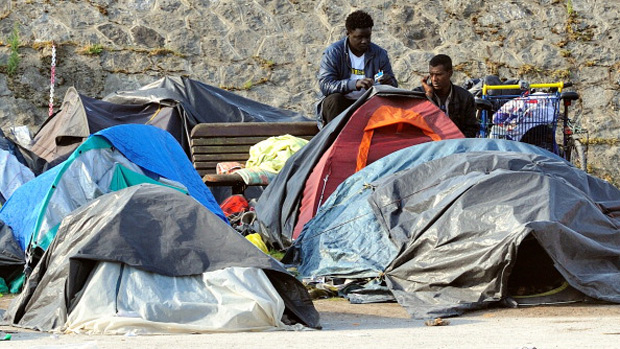Calais migrant crisis: how can the 'border war' be solved?
Migrants try to storm ferry bound for Dover as politicians argue over security responsibilities

A free daily email with the biggest news stories of the day – and the best features from TheWeek.com
You are now subscribed
Your newsletter sign-up was successful
Hundreds of migrants in Calais tried to storm a ferry travelling to the UK after overpowering security forces in the French port. They were stopped from boarding the vessel after staff raised the entry ramp and used a fire hose to keep them at bay, the BBC reports.
Yesterday the mayor of Calais, Nathalie Bouchart threatened to blockade the port unless the UK did more to tackle the issue of illegal immigration, saying the city has been "taken hostage" by migrants attempting to cross the English Channel. "It would be illegal, but I want a strong response from the British," the centre-right politician said.
She has accused the British of demanding tough border controls but says the government has failed to contribute to the cost.
The Week
Escape your echo chamber. Get the facts behind the news, plus analysis from multiple perspectives.

Sign up for The Week's Free Newsletters
From our morning news briefing to a weekly Good News Newsletter, get the best of The Week delivered directly to your inbox.
From our morning news briefing to a weekly Good News Newsletter, get the best of The Week delivered directly to your inbox.
Calais is at the "front line of Britain's battle to control immigration", writes Thom Brookes for The Conversation, and up to 35 migrants are believed to make it across into the UK every day. So what needs to be done deal with the ongoing crisis at France's busiest ferry port?
A long history of migrant camps
In 1999 the Sangatte refugee camp was set up by the French government and the Red Cross to house up to 900 refugees, but numbers quickly rose above 2,000. At the end of 2002, French and UK officials feared it was being used as base for human trafficking and it was shut down, sparking violent riots.
Since then, illegal camps have continued to spring up in its place. Police have made numerous attempts to clear them. One of the most recent attempts to evict the migrants was made by riot police earlier this year following a scabies outbreak.
A free daily email with the biggest news stories of the day – and the best features from TheWeek.com
What is the situation like in Calais at the moment?
Life is the camps is "verging on the primeval", according to special report by The Independent. "England is the house. We are not even in the toilet. We are in the sewer outside," said one Afghan migrant who has been there for several months.
There are currently over 1,000 migrants at the port, many of whom are asylum seekers fleeing wars or persecution in Syria, North Africa and Afghanistan. Some are economic migrants. They largely depend on charities for food and report daily harassment and abuse from police, a claim French officials deny. One man said "We are treated little better than dogs" by the authorities.
Migrants have long been protesting for the "basic dignity" of having water and proper sanitation at the makeshift camps, something the authorities have refused to deliver.
What can be done?
French authorities are determined to clear the camps, but the migrants say they have nowhere else to go. France is now demanding meetings with the Home Office to jointly address the issue, but the UK rejects responsibility. Earlier this year, a Home Office spokesperson said: "The conditions of any camps in France and the policing of them is the responsibility of the French authorities."
Ben Bano, from the UK-based refugee group Seeking Sanctuary said: "It has long been in the interests of the British and French governments for nothing much to happen in Calais. The only losers are the asylum seekers and their families."
-
 A dreamy long weekend on the Amalfi Coast
A dreamy long weekend on the Amalfi CoastThe Week Recommends History, pasta, scenic views – this sun-drenched stretch of Italy’s southern coast has it all
-
 Can foster care overhaul stop ‘exodus’ of carers?
Can foster care overhaul stop ‘exodus’ of carers?Today’s Big Question Government announces plans to modernise ‘broken’ system and recruit more carers, but fostering remains unevenly paid and highly stressful
-
 6 exquisite homes with vast acreage
6 exquisite homes with vast acreageFeature Featuring an off-the-grid contemporary home in New Mexico and lakefront farmhouse in Massachusetts
-
 Epstein files topple law CEO, roil UK government
Epstein files topple law CEO, roil UK governmentSpeed Read Peter Mandelson, Britain’s former ambassador to the US, is caught up in the scandal
-
 Iran and US prepare to meet after skirmishes
Iran and US prepare to meet after skirmishesSpeed Read The incident comes amid heightened tensions in the Middle East
-
 Israel retrieves final hostage’s body from Gaza
Israel retrieves final hostage’s body from GazaSpeed Read The 24-year-old police officer was killed during the initial Hamas attack
-
 China’s Xi targets top general in growing purge
China’s Xi targets top general in growing purgeSpeed Read Zhang Youxia is being investigated over ‘grave violations’ of the law
-
 Panama and Canada are negotiating over a crucial copper mine
Panama and Canada are negotiating over a crucial copper mineIn the Spotlight Panama is set to make a final decision on the mine this summer
-
 Why Greenland’s natural resources are nearly impossible to mine
Why Greenland’s natural resources are nearly impossible to mineThe Explainer The country’s natural landscape makes the task extremely difficult
-
 Iran cuts internet as protests escalate
Iran cuts internet as protests escalateSpeed Reada Government buildings across the country have been set on fire
-
 US nabs ‘shadow’ tanker claimed by Russia
US nabs ‘shadow’ tanker claimed by RussiaSpeed Read The ship was one of two vessels seized by the US military